Schools in Kazakhstan
Schools in Kazakhstan
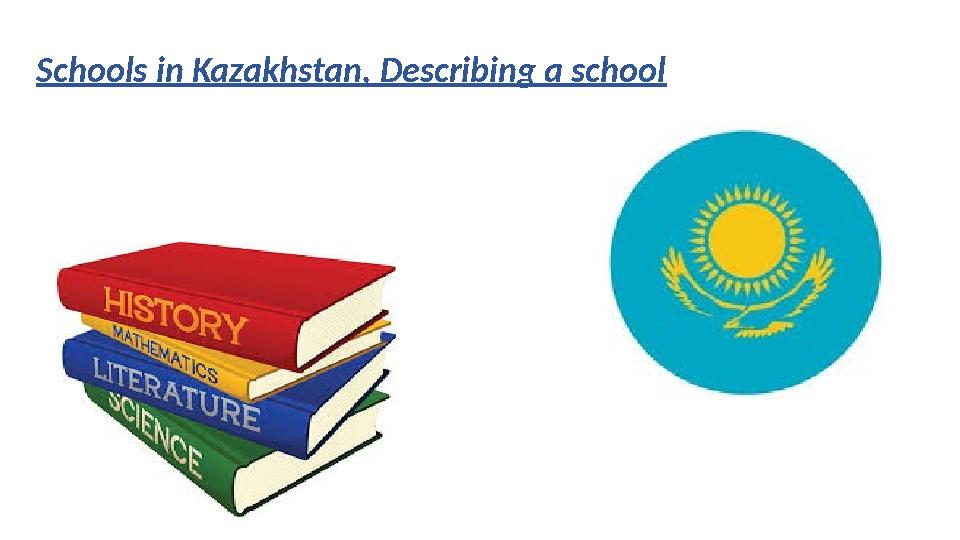

#1 слайд
Schools in Kazakhstan, Describing a school
1 слайд
Schools in Kazakhstan, Describing a school
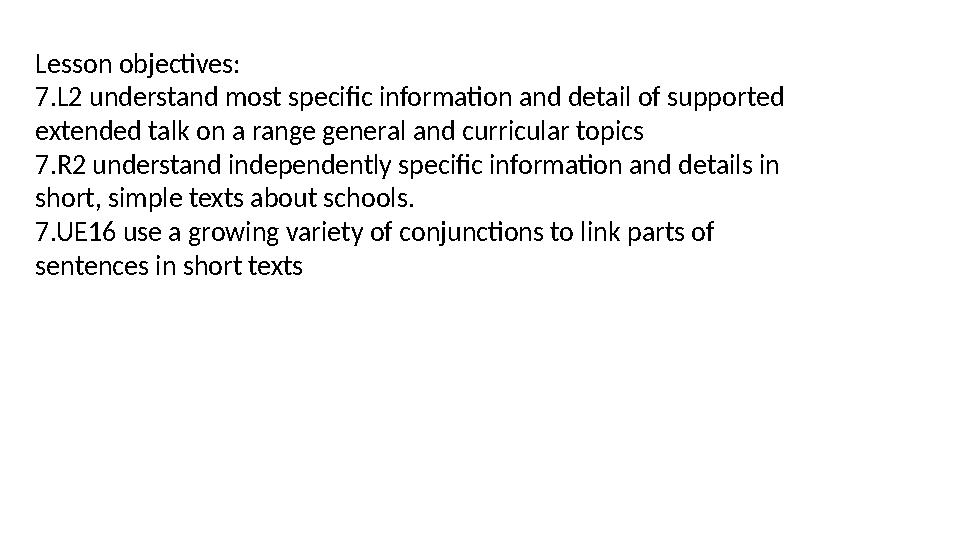
#2 слайд
Lesson objectives:
7.L2 understand most specific information and detail of supported
extended talk on a range general and curricular topics
7.R2 understand independently specific information and details in
short, simple texts about schools.
7.UE16 use a growing variety of conjunctions to link parts of
sentences in short texts
2 слайд
Lesson objectives: 7.L2 understand most specific information and detail of supported extended talk on a range general and curricular topics 7.R2 understand independently specific information and details in short, simple texts about schools. 7.UE16 use a growing variety of conjunctions to link parts of sentences in short texts
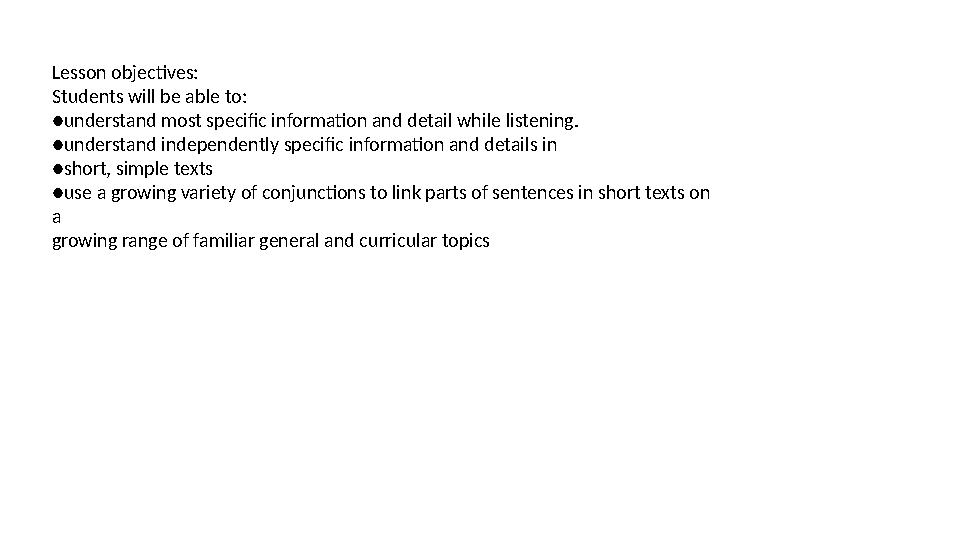
#3 слайд
Lesson objectives:
Students will be able to:
●understand most specific information and detail while listening.
●understand independently specific information and details in
●short, simple texts
●use a growing variety of conjunctions to link parts of sentences in short texts on
a
growing range of familiar general and curricular topics
3 слайд
Lesson objectives: Students will be able to: ●understand most specific information and detail while listening. ●understand independently specific information and details in ●short, simple texts ●use a growing variety of conjunctions to link parts of sentences in short texts on a growing range of familiar general and curricular topics
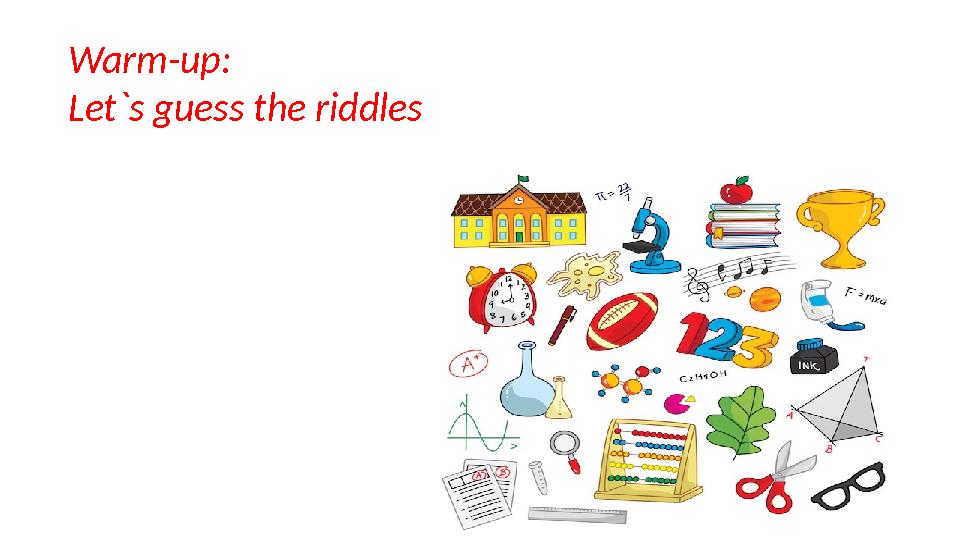
#4 слайд
Warm-up:
Let`s guess the riddles
4 слайд
Warm-up: Let`s guess the riddles
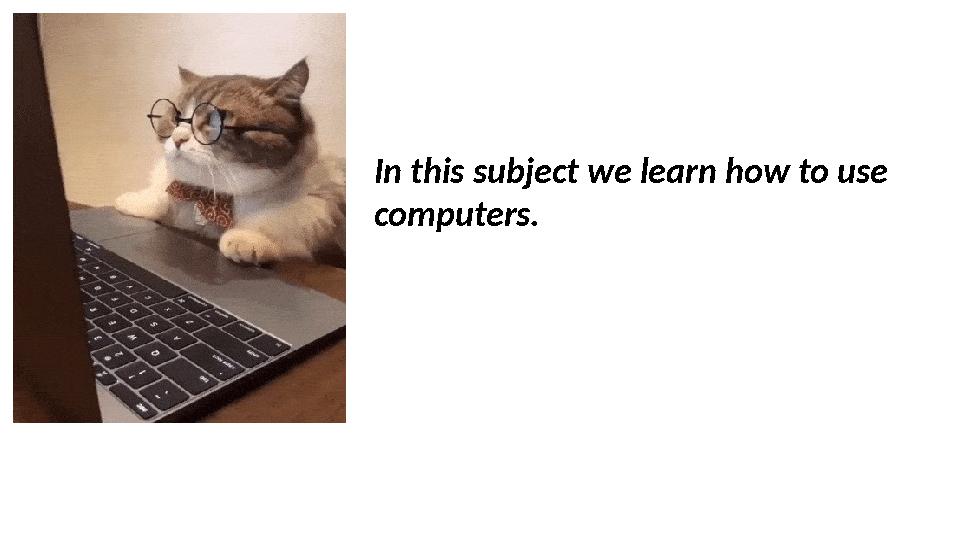
#5 слайд
In this subject we learn how to use
computers.
5 слайд
In this subject we learn how to use computers.
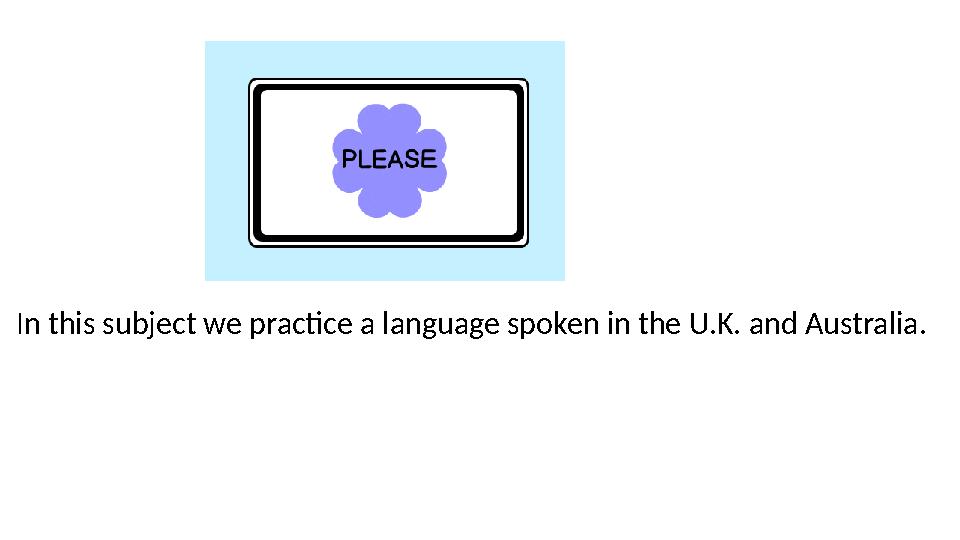
#6 слайд
In this subject we practice a language spoken in the U.K. and Australia.
6 слайд
In this subject we practice a language spoken in the U.K. and Australia.
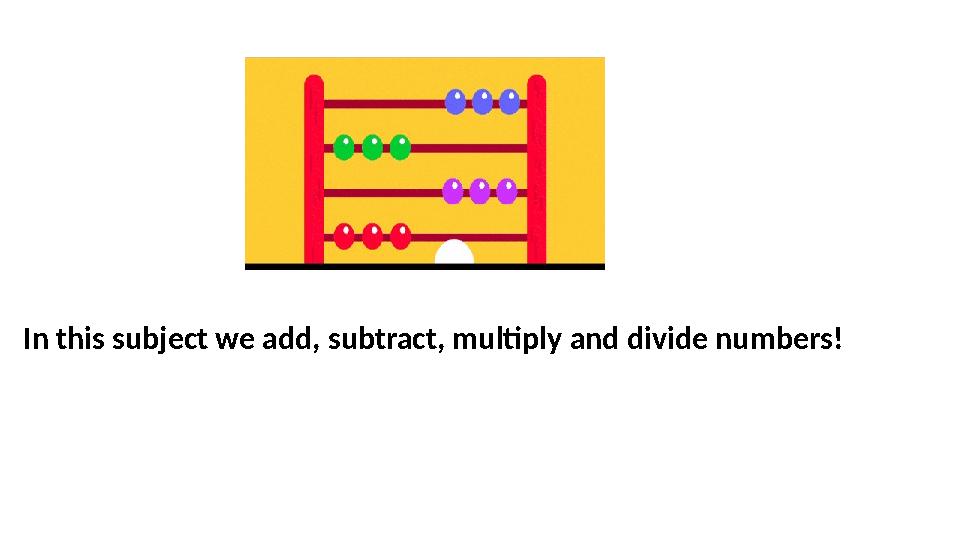
#7 слайд
In this subject we add, subtract, multiply and divide numbers!
7 слайд
In this subject we add, subtract, multiply and divide numbers!
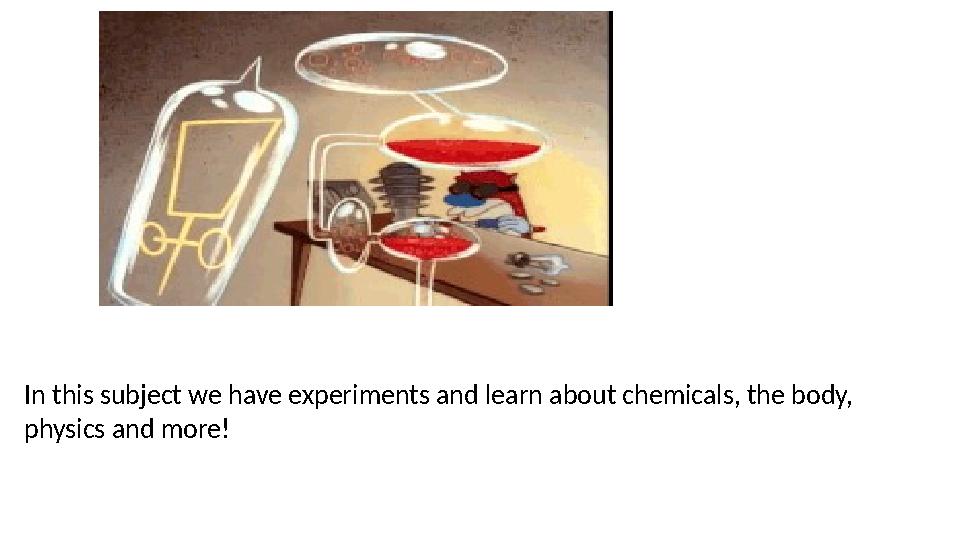
#8 слайд
In this subject we have experiments and learn about chemicals, the body,
physics and more!
8 слайд
In this subject we have experiments and learn about chemicals, the body, physics and more!
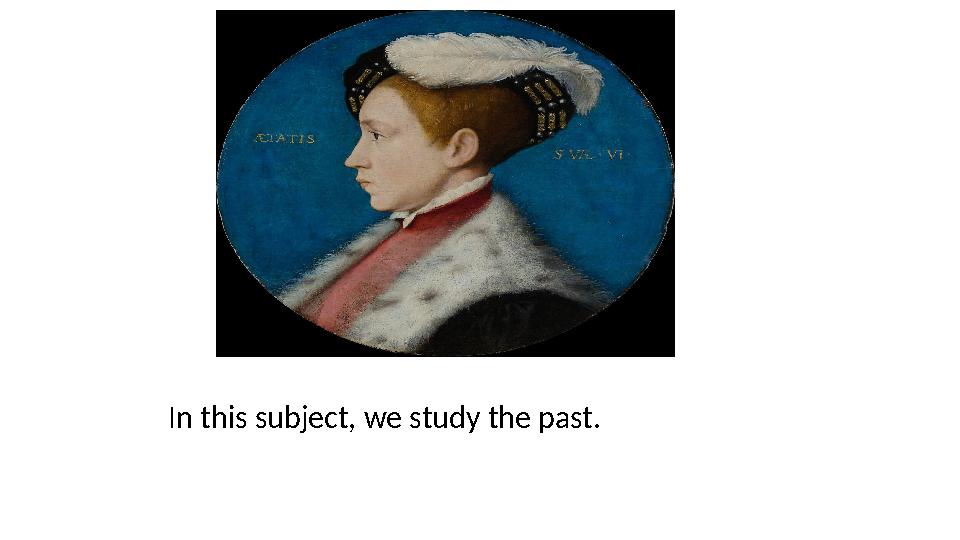
#9 слайд
In this subject, we study the past.
9 слайд
In this subject, we study the past.
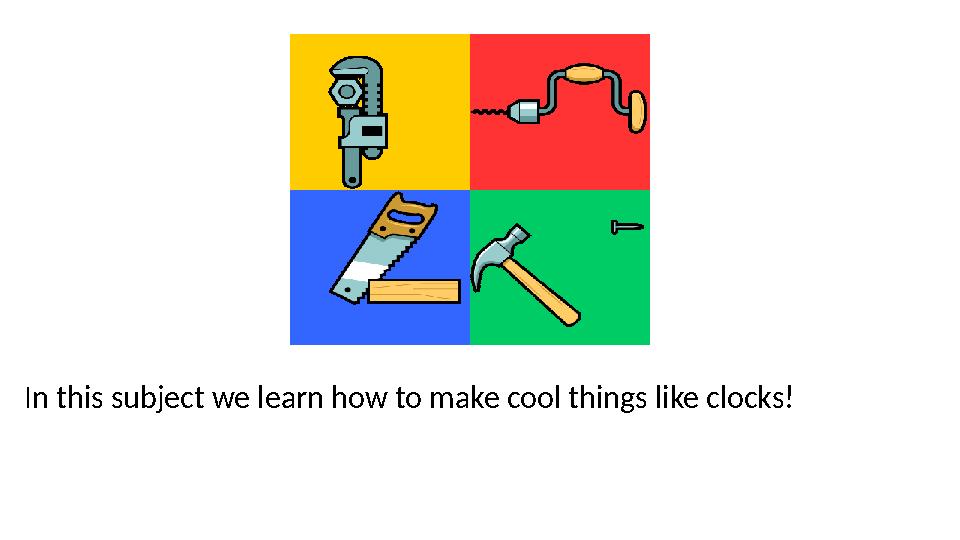
#10 слайд
In this subject we learn how to make cool things like clocks!
10 слайд
In this subject we learn how to make cool things like clocks!
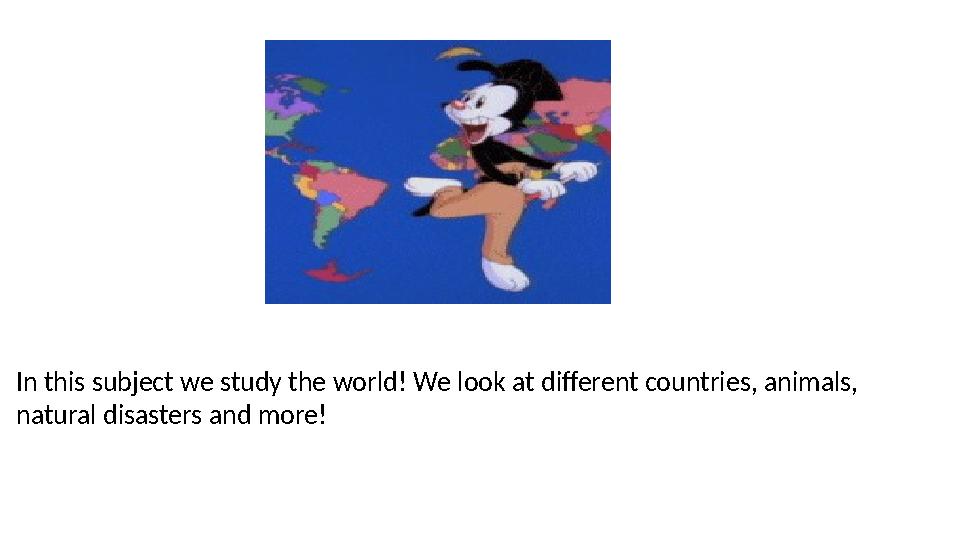
#11 слайд
In this subject we study the world! We look at different countries, animals,
natural disasters and more!
11 слайд
In this subject we study the world! We look at different countries, animals, natural disasters and more!
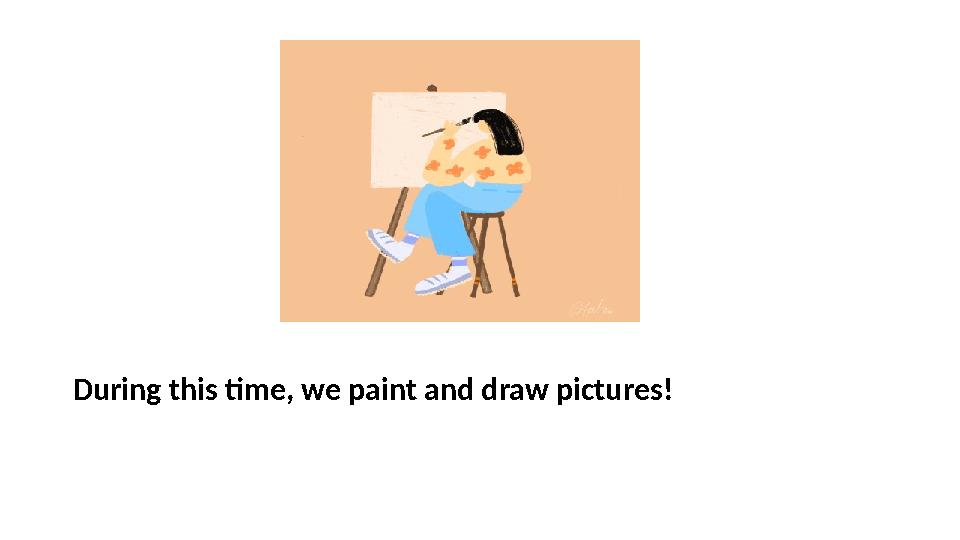
#12 слайд
During this time, we paint and draw pictures!
12 слайд
During this time, we paint and draw pictures!
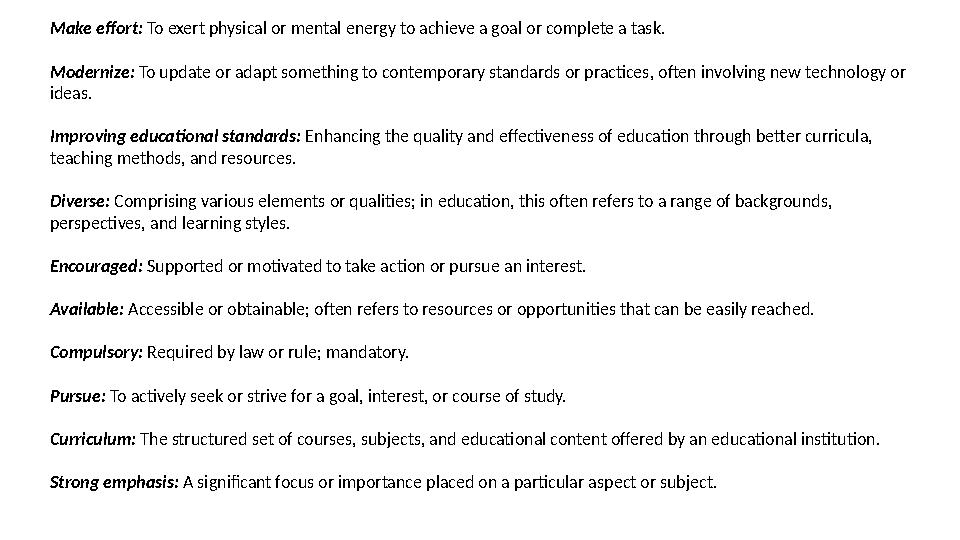
#13 слайд
Make effort: To exert physical or mental energy to achieve a goal or complete a task.
Modernize: To update or adapt something to contemporary standards or practices, often involving new technology or
ideas.
Improving educational standards: Enhancing the quality and effectiveness of education through better curricula,
teaching methods, and resources.
Diverse: Comprising various elements or qualities; in education, this often refers to a range of backgrounds,
perspectives, and learning styles.
Encouraged: Supported or motivated to take action or pursue an interest.
Available: Accessible or obtainable; often refers to resources or opportunities that can be easily reached.
Compulsory: Required by law or rule; mandatory.
Pursue: To actively seek or strive for a goal, interest, or course of study.
Curriculum: The structured set of courses, subjects, and educational content offered by an educational institution.
Strong emphasis: A significant focus or importance placed on a particular aspect or subject.
13 слайд
Make effort: To exert physical or mental energy to achieve a goal or complete a task. Modernize: To update or adapt something to contemporary standards or practices, often involving new technology or ideas. Improving educational standards: Enhancing the quality and effectiveness of education through better curricula, teaching methods, and resources. Diverse: Comprising various elements or qualities; in education, this often refers to a range of backgrounds, perspectives, and learning styles. Encouraged: Supported or motivated to take action or pursue an interest. Available: Accessible or obtainable; often refers to resources or opportunities that can be easily reached. Compulsory: Required by law or rule; mandatory. Pursue: To actively seek or strive for a goal, interest, or course of study. Curriculum: The structured set of courses, subjects, and educational content offered by an educational institution. Strong emphasis: A significant focus or importance placed on a particular aspect or subject.
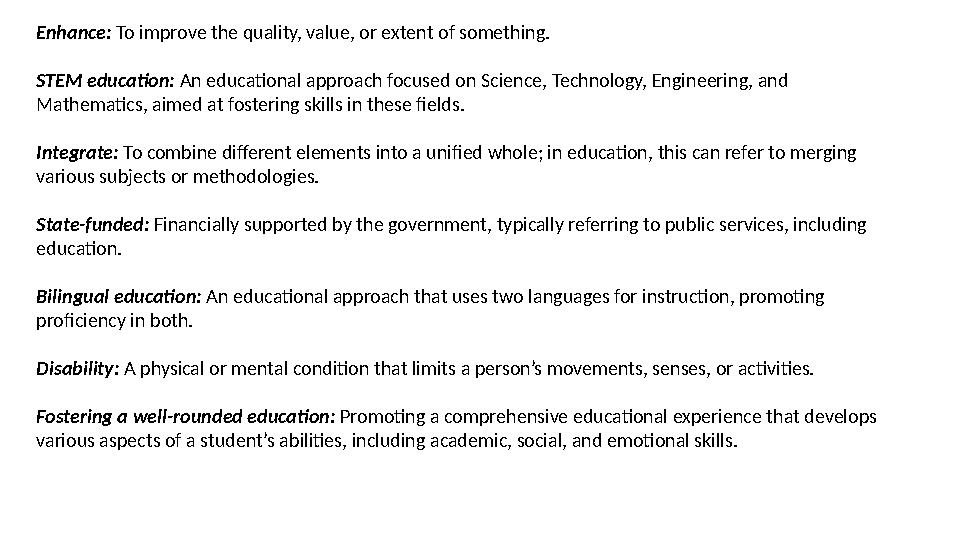
#14 слайд
Enhance: To improve the quality, value, or extent of something.
STEM education: An educational approach focused on Science, Technology, Engineering, and
Mathematics, aimed at fostering skills in these fields.
Integrate: To combine different elements into a unified whole; in education, this can refer to merging
various subjects or methodologies.
State-funded: Financially supported by the government, typically referring to public services, including
education.
Bilingual education: An educational approach that uses two languages for instruction, promoting
proficiency in both.
Disability: A physical or mental condition that limits a person’s movements, senses, or activities.
Fostering a well-rounded education: Promoting a comprehensive educational experience that develops
various aspects of a student’s abilities, including academic, social, and emotional skills.
14 слайд
Enhance: To improve the quality, value, or extent of something. STEM education: An educational approach focused on Science, Technology, Engineering, and Mathematics, aimed at fostering skills in these fields. Integrate: To combine different elements into a unified whole; in education, this can refer to merging various subjects or methodologies. State-funded: Financially supported by the government, typically referring to public services, including education. Bilingual education: An educational approach that uses two languages for instruction, promoting proficiency in both. Disability: A physical or mental condition that limits a person’s movements, senses, or activities. Fostering a well-rounded education: Promoting a comprehensive educational experience that develops various aspects of a student’s abilities, including academic, social, and emotional skills.
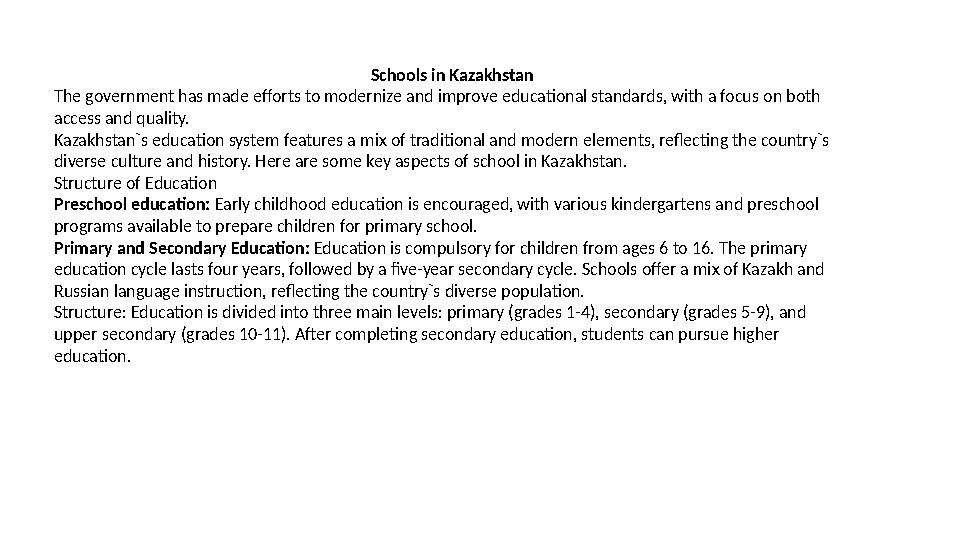
#15 слайд
Schools in Kazakhstan
The government has made efforts to modernize and improve educational standards, with a focus on both
access and quality.
Kazakhstan`s education system features a mix of traditional and modern elements, reflecting the country`s
diverse culture and history. Here are some key aspects of school in Kazakhstan.
Structure of Education
Preschool education: Early childhood education is encouraged, with various kindergartens and preschool
programs available to prepare children for primary school.
Primary and Secondary Education: Education is compulsory for children from ages 6 to 16. The primary
education cycle lasts four years, followed by a five-year secondary cycle. Schools offer a mix of Kazakh and
Russian language instruction, reflecting the country`s diverse population.
Structure: Education is divided into three main levels: primary (grades 1-4), secondary (grades 5-9), and
upper secondary (grades 10-11). After completing secondary education, students can pursue higher
education.
15 слайд
Schools in Kazakhstan The government has made efforts to modernize and improve educational standards, with a focus on both access and quality. Kazakhstan`s education system features a mix of traditional and modern elements, reflecting the country`s diverse culture and history. Here are some key aspects of school in Kazakhstan. Structure of Education Preschool education: Early childhood education is encouraged, with various kindergartens and preschool programs available to prepare children for primary school. Primary and Secondary Education: Education is compulsory for children from ages 6 to 16. The primary education cycle lasts four years, followed by a five-year secondary cycle. Schools offer a mix of Kazakh and Russian language instruction, reflecting the country`s diverse population. Structure: Education is divided into three main levels: primary (grades 1-4), secondary (grades 5-9), and upper secondary (grades 10-11). After completing secondary education, students can pursue higher education.
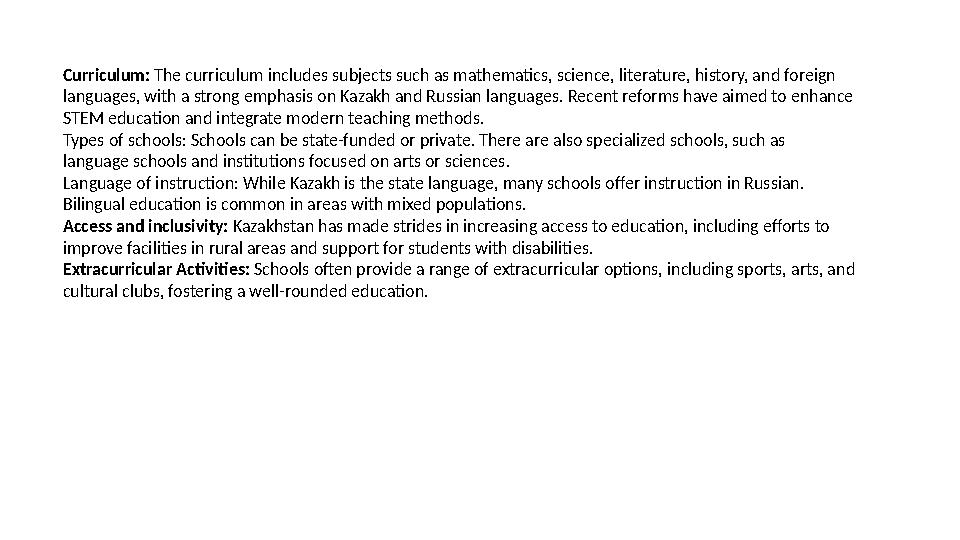
#16 слайд
Curriculum: The curriculum includes subjects such as mathematics, science, literature, history, and foreign
languages, with a strong emphasis on Kazakh and Russian languages. Recent reforms have aimed to enhance
STEM education and integrate modern teaching methods.
Types of schools: Schools can be state-funded or private. There are also specialized schools, such as
language schools and institutions focused on arts or sciences.
Language of instruction: While Kazakh is the state language, many schools offer instruction in Russian.
Bilingual education is common in areas with mixed populations.
Access and inclusivity: Kazakhstan has made strides in increasing access to education, including efforts to
improve facilities in rural areas and support for students with disabilities.
Extracurricular Activities: Schools often provide a range of extracurricular options, including sports, arts, and
cultural clubs, fostering a well-rounded education.
16 слайд
Curriculum: The curriculum includes subjects such as mathematics, science, literature, history, and foreign languages, with a strong emphasis on Kazakh and Russian languages. Recent reforms have aimed to enhance STEM education and integrate modern teaching methods. Types of schools: Schools can be state-funded or private. There are also specialized schools, such as language schools and institutions focused on arts or sciences. Language of instruction: While Kazakh is the state language, many schools offer instruction in Russian. Bilingual education is common in areas with mixed populations. Access and inclusivity: Kazakhstan has made strides in increasing access to education, including efforts to improve facilities in rural areas and support for students with disabilities. Extracurricular Activities: Schools often provide a range of extracurricular options, including sports, arts, and cultural clubs, fostering a well-rounded education.
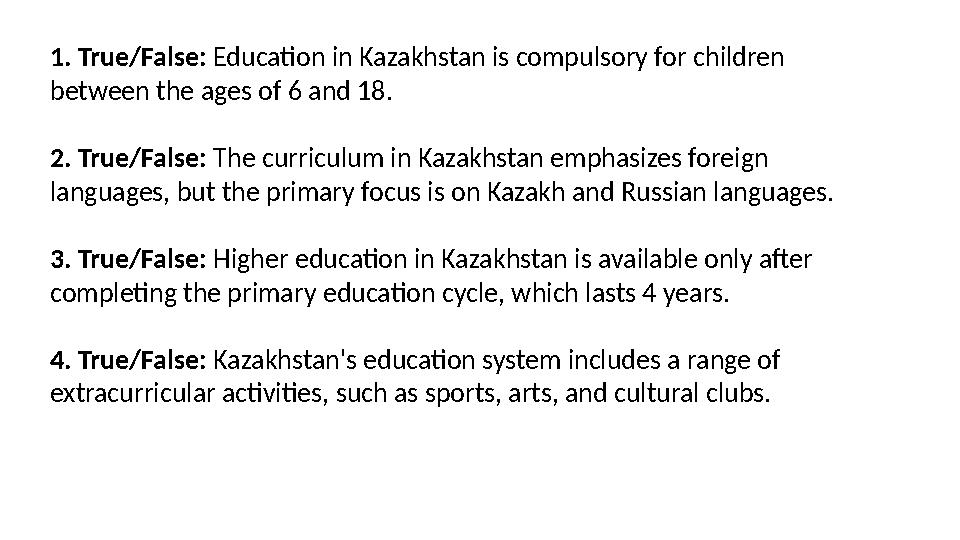
#17 слайд
1. True/False: Education in Kazakhstan is compulsory for children
between the ages of 6 and 18.
2. True/False: The curriculum in Kazakhstan emphasizes foreign
languages, but the primary focus is on Kazakh and Russian languages.
3. True/False: Higher education in Kazakhstan is available only after
completing the primary education cycle, which lasts 4 years.
4. True/False: Kazakhstan's education system includes a range of
extracurricular activities, such as sports, arts, and cultural clubs.
17 слайд
1. True/False: Education in Kazakhstan is compulsory for children between the ages of 6 and 18. 2. True/False: The curriculum in Kazakhstan emphasizes foreign languages, but the primary focus is on Kazakh and Russian languages. 3. True/False: Higher education in Kazakhstan is available only after completing the primary education cycle, which lasts 4 years. 4. True/False: Kazakhstan's education system includes a range of extracurricular activities, such as sports, arts, and cultural clubs.
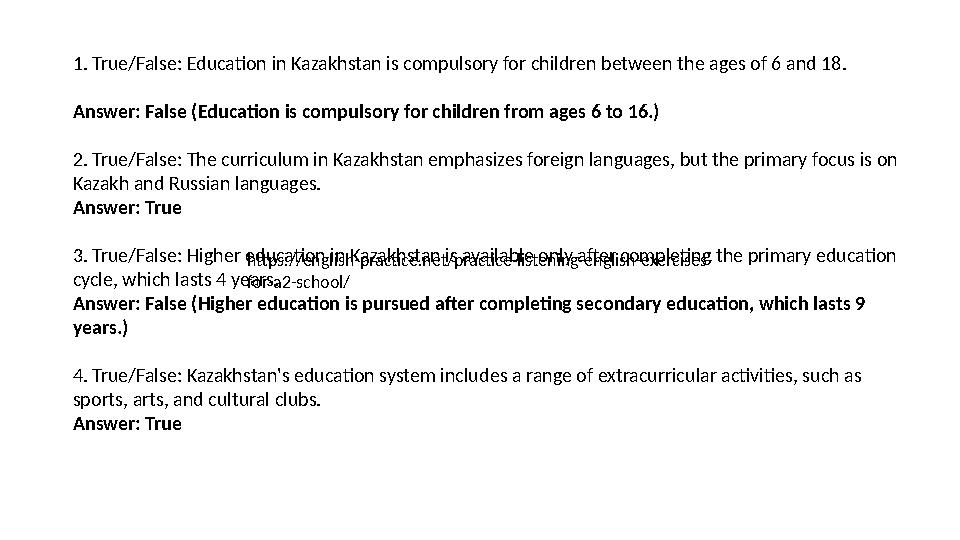
#18 слайд
1. True/False: Education in Kazakhstan is compulsory for children between the ages of 6 and 18.
Answer: False (Education is compulsory for children from ages 6 to 16.)
2. True/False: The curriculum in Kazakhstan emphasizes foreign languages, but the primary focus is on
Kazakh and Russian languages.
Answer: True
3. True/False: Higher education in Kazakhstan is available only after completing the primary education
cycle, which lasts 4 years.
Answer: False (Higher education is pursued after completing secondary education, which lasts 9
years.)
4. True/False: Kazakhstan's education system includes a range of extracurricular activities, such as
sports, arts, and cultural clubs.
Answer: True
https://english-practice.net/practice-listening-english-exercises-
for-a2-school/
18 слайд
1. True/False: Education in Kazakhstan is compulsory for children between the ages of 6 and 18. Answer: False (Education is compulsory for children from ages 6 to 16.) 2. True/False: The curriculum in Kazakhstan emphasizes foreign languages, but the primary focus is on Kazakh and Russian languages. Answer: True 3. True/False: Higher education in Kazakhstan is available only after completing the primary education cycle, which lasts 4 years. Answer: False (Higher education is pursued after completing secondary education, which lasts 9 years.) 4. True/False: Kazakhstan's education system includes a range of extracurricular activities, such as sports, arts, and cultural clubs. Answer: True https://english-practice.net/practice-listening-english-exercises- for-a2-school/
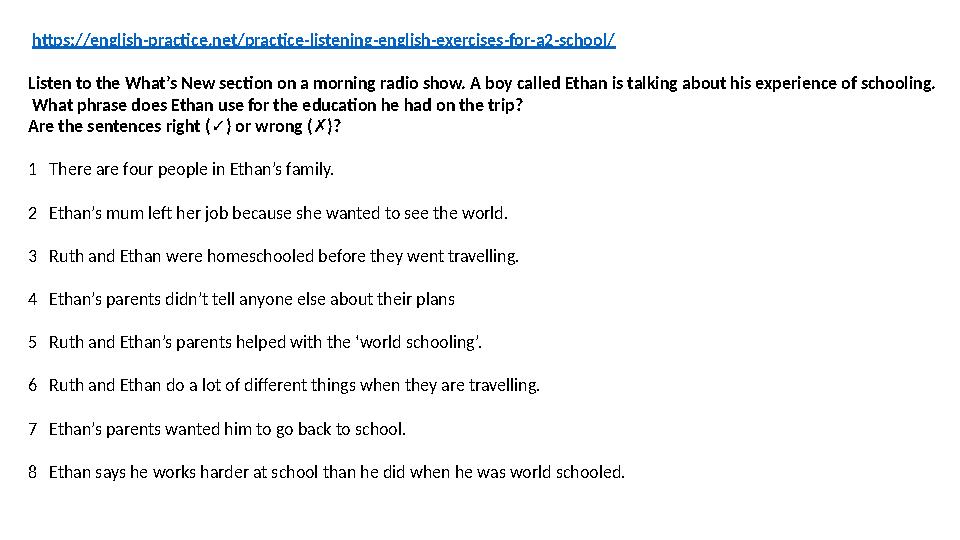
#19 слайд
https://english-practice.net/practice-listening-english-exercises-for-a2-school/
Listen to the What’s New section on a morning radio show. A boy called Ethan is talking about his experience of schooling.
What phrase does Ethan use for the education he had on the trip?
Are the sentences right ( ) or wrong ( )?
✓ ✗
1 There are four people in Ethan’s family.
2 Ethan’s mum left her job because she wanted to see the world.
3 Ruth and Ethan were homeschooled before they went travelling.
4 Ethan’s parents didn’t tell anyone else about their plans
5 Ruth and Ethan’s parents helped with the ‘world schooling’.
6 Ruth and Ethan do a lot of different things when they are travelling.
7 Ethan’s parents wanted him to go back to school.
8 Ethan says he works harder at school than he did when he was world schooled.
19 слайд
https://english-practice.net/practice-listening-english-exercises-for-a2-school/ Listen to the What’s New section on a morning radio show. A boy called Ethan is talking about his experience of schooling. What phrase does Ethan use for the education he had on the trip? Are the sentences right ( ) or wrong ( )? ✓ ✗ 1 There are four people in Ethan’s family. 2 Ethan’s mum left her job because she wanted to see the world. 3 Ruth and Ethan were homeschooled before they went travelling. 4 Ethan’s parents didn’t tell anyone else about their plans 5 Ruth and Ethan’s parents helped with the ‘world schooling’. 6 Ruth and Ethan do a lot of different things when they are travelling. 7 Ethan’s parents wanted him to go back to school. 8 Ethan says he works harder at school than he did when he was world schooled.
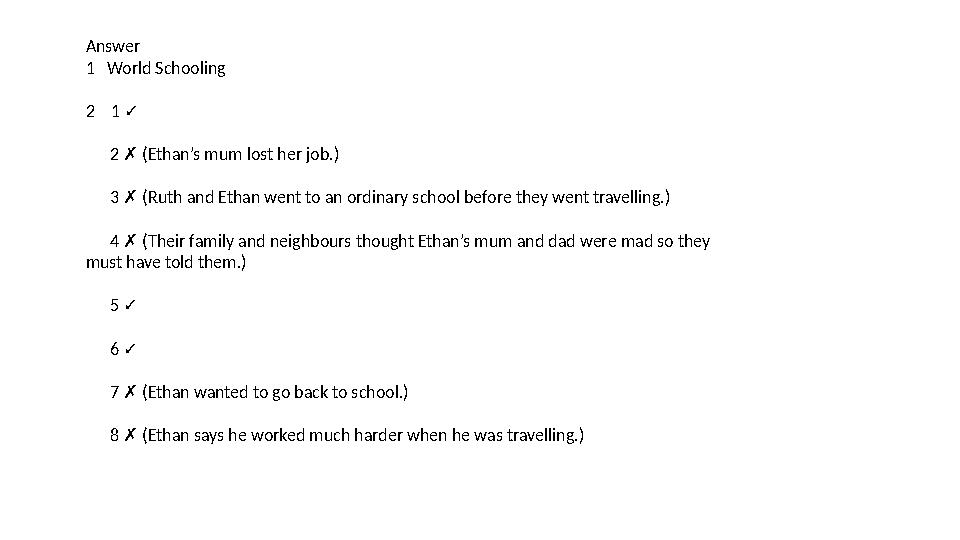
#20 слайд
Answer
1 World Schooling
2 1
✓
2 (Ethan’s mum lost her job.)
✗
3 (Ruth and Ethan went to an ordinary school before they went travelling.)
✗
4 (Their family and neighbours thought Ethan’s mum and dad were mad so they
✗
must have told them.)
5
✓
6
✓
7 (Ethan wanted to go back to school.)
✗
8 (Ethan says he worked much harder when he was travelling.)
✗
20 слайд
Answer 1 World Schooling 2 1 ✓ 2 (Ethan’s mum lost her job.) ✗ 3 (Ruth and Ethan went to an ordinary school before they went travelling.) ✗ 4 (Their family and neighbours thought Ethan’s mum and dad were mad so they ✗ must have told them.) 5 ✓ 6 ✓ 7 (Ethan wanted to go back to school.) ✗ 8 (Ethan says he worked much harder when he was travelling.) ✗
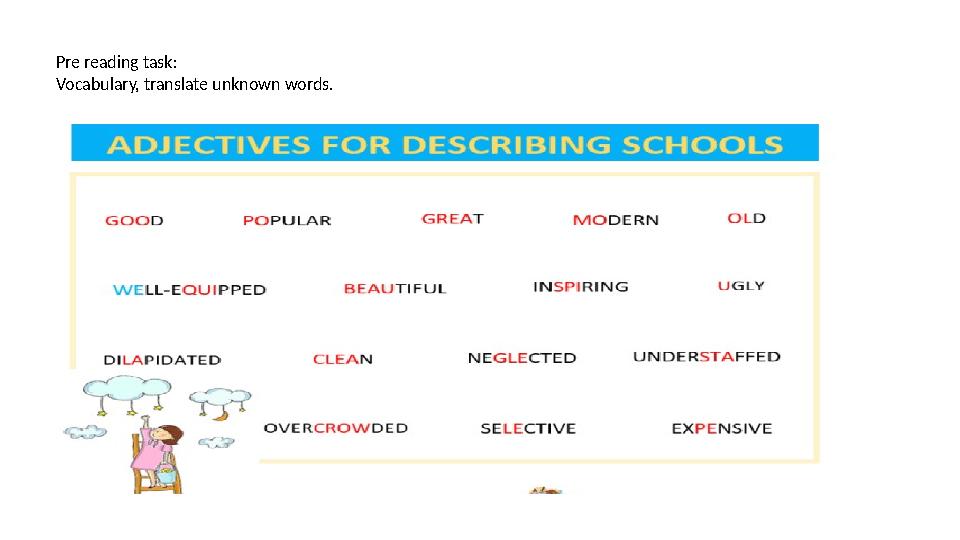
#21 слайд
Pre reading task:
Vocabulary, translate unknown words.
21 слайд
Pre reading task: Vocabulary, translate unknown words.
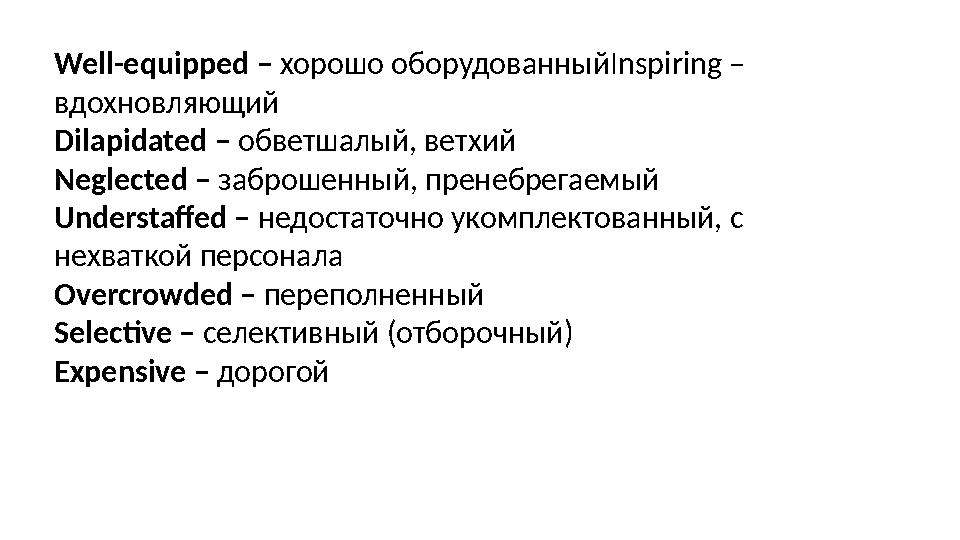
#22 слайд
Well-equipped – хорошо оборудованныйInspiring –
вдохновляющий
Dilapidated – обветшалый, ветхий
Neglected – заброшенный, пренебрегаемый
Understaffed – недостаточно укомплектованный, с
нехваткой персонала
Overcrowded – переполненный
Selective – селективный (отборочный)
Expensive – дорогой
22 слайд
Well-equipped – хорошо оборудованныйInspiring – вдохновляющий Dilapidated – обветшалый, ветхий Neglected – заброшенный, пренебрегаемый Understaffed – недостаточно укомплектованный, с нехваткой персонала Overcrowded – переполненный Selective – селективный (отборочный) Expensive – дорогой
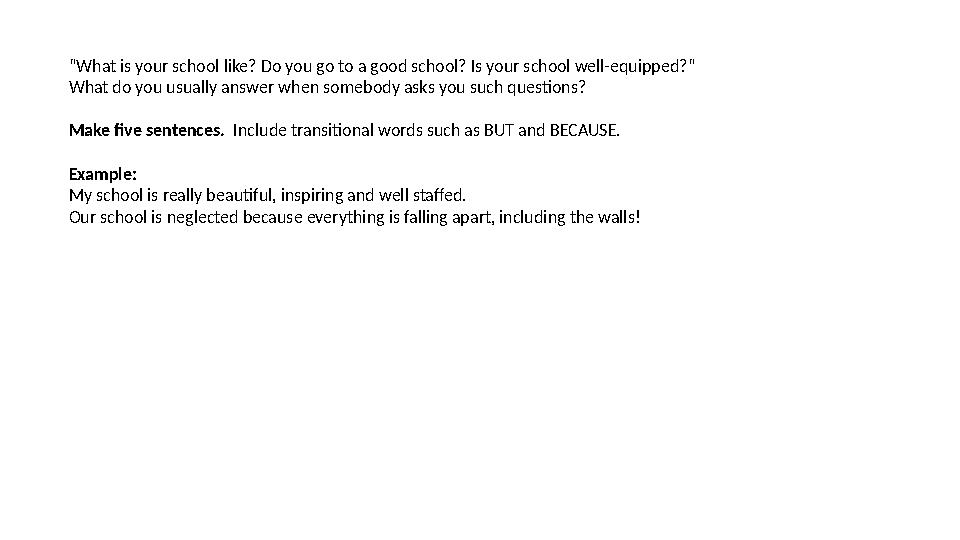
#23 слайд
“What is your school like? Do you go to a good school? Is your school well-equipped?“
What do you usually answer when somebody asks you such questions?
Make five sentences. Include transitional words such as BUT and BECAUSE.
Example:
My school is really beautiful, inspiring and well staffed.
Our school is neglected because everything is falling apart, including the walls!
23 слайд
“What is your school like? Do you go to a good school? Is your school well-equipped?“ What do you usually answer when somebody asks you such questions? Make five sentences. Include transitional words such as BUT and BECAUSE. Example: My school is really beautiful, inspiring and well staffed. Our school is neglected because everything is falling apart, including the walls!
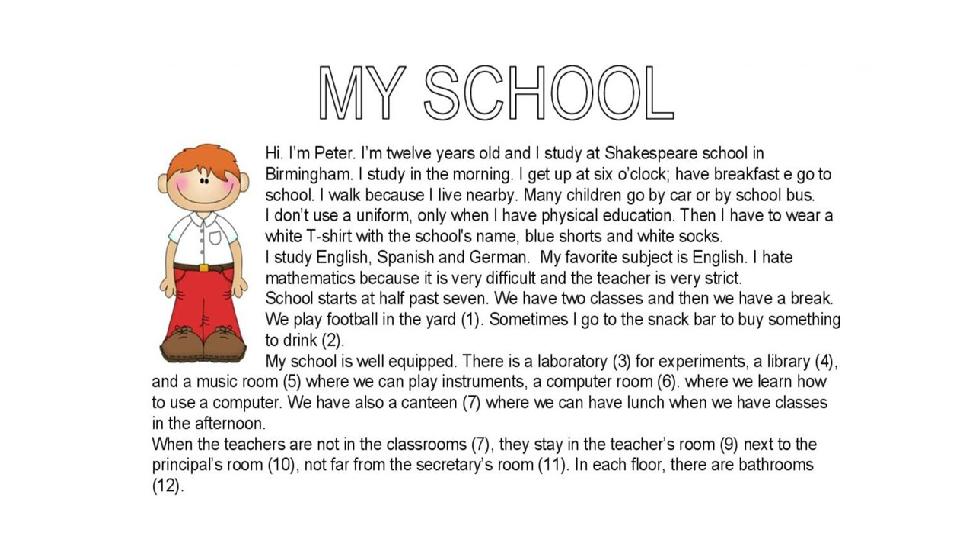
#24 слайд
24 слайд
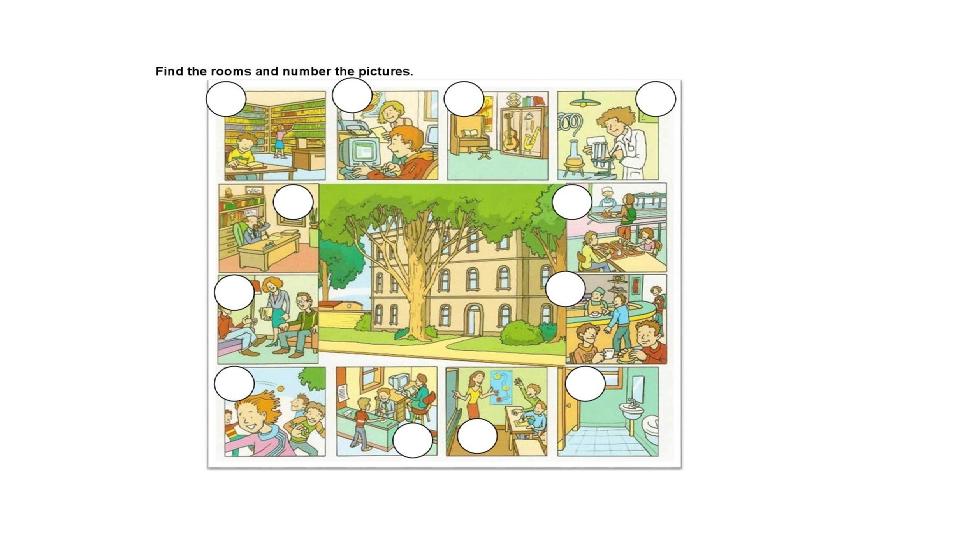
#25 слайд
25 слайд
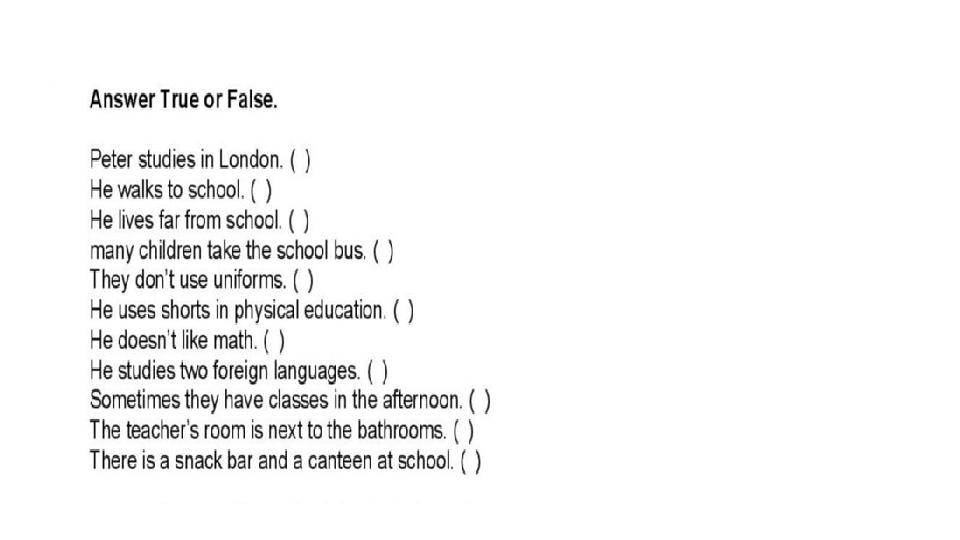
#26 слайд
26 слайд

#27 слайд
27 слайд
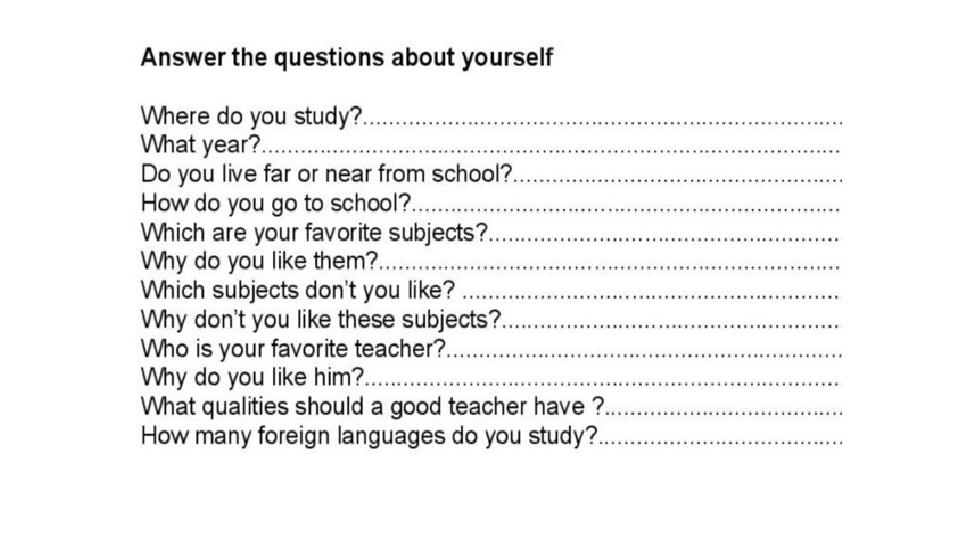
#28 слайд
28 слайд
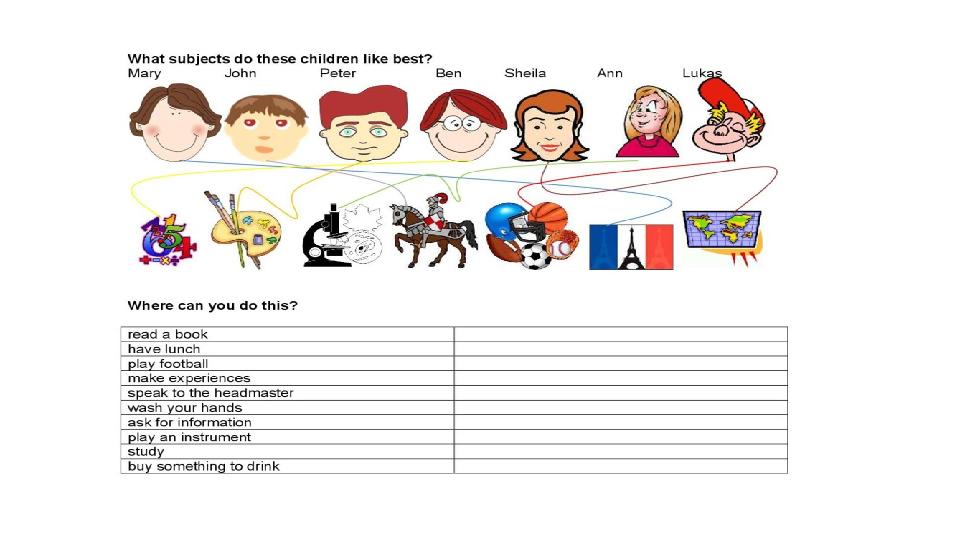
#29 слайд
29 слайд
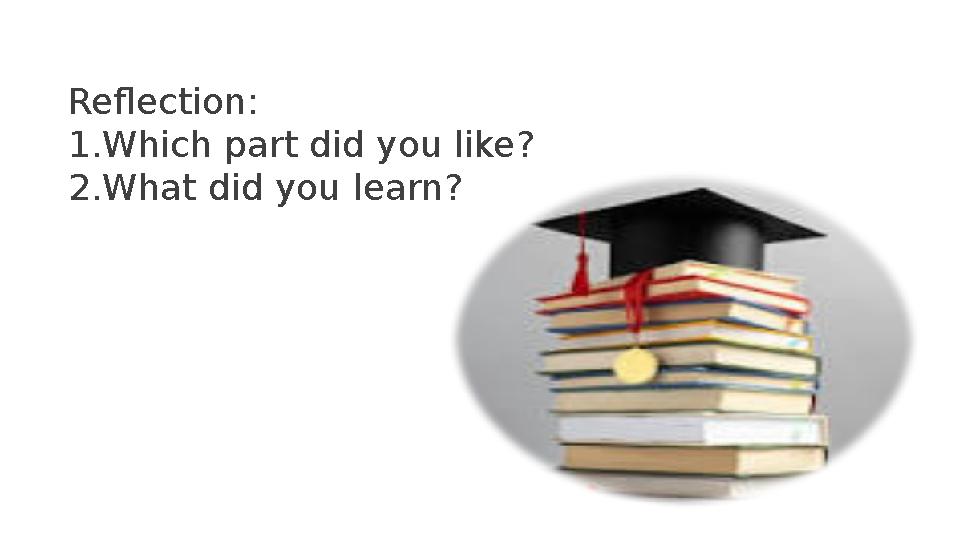
#30 слайд
Reflection:
1.Which part did you like?
2.What did you learn?
30 слайд
Reflection: 1.Which part did you like? 2.What did you learn?

шағым қалдыра аласыз
















